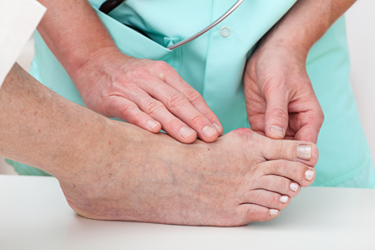
 A bunion, also known as hallux valgus, is a common deformity of the big toe. Bunions occur when the joint between the foot and toe is overextended, causing the big toe to bend towards the little toes. In severe cases, the big toe might even go over or under the second toe. This typically results in pain and inflammation, and can even cause arthritis to develop in the big toe. A bunion may sometimes require surgical correction. In cases where less invasive treatments have failed, surgery might be recommended to correct painful misalignment, to fix the deformity before it becomes worse, to reduce mobility restrictions, or to improve the cosmetic appearance of the foot. If you have a painful bunion, it is suggested that you consult with a podiatrist to explore treatment options.
A bunion, also known as hallux valgus, is a common deformity of the big toe. Bunions occur when the joint between the foot and toe is overextended, causing the big toe to bend towards the little toes. In severe cases, the big toe might even go over or under the second toe. This typically results in pain and inflammation, and can even cause arthritis to develop in the big toe. A bunion may sometimes require surgical correction. In cases where less invasive treatments have failed, surgery might be recommended to correct painful misalignment, to fix the deformity before it becomes worse, to reduce mobility restrictions, or to improve the cosmetic appearance of the foot. If you have a painful bunion, it is suggested that you consult with a podiatrist to explore treatment options.
If you are suffering from bunions, contact Dr. Alan J. Spector of Shore Podiatry. Our doctor can provide the care you need to keep you pain-free and on your feet.
What Is a Bunion?
A bunion is formed of swollen tissue or an enlargement of boney growth, usually located at the base joint of the toe that connects to the foot. The swelling occurs due to the bones in the big toe shifting inward, which impacts the other toes of the foot. This causes the area around the base of the big toe to become inflamed and painful.
Why Do Bunions Form?
Genetics – Susceptibility to bunions are often hereditary
Stress on the feet – Poorly fitted and uncomfortable footwear that places stress on feet, such as heels, can worsen existing bunions
How Are Bunions Diagnosed?
Doctors often perform two tests – blood tests and x-rays – when trying to diagnose bunions, especially in the early stages of development. Blood tests help determine if the foot pain is being caused by something else, such as arthritis, while x-rays provide a clear picture of your bone structure to your doctor.
How Are Bunions Treated?
If you have any questions, please feel free to contact our office located in Point Pleasant, NJ . We offer the newest diagnostic and treatment technologies for all your foot care needs.